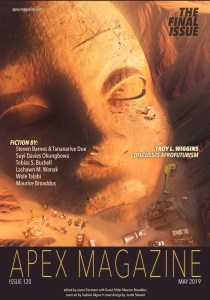“Dune Song” by Suyi Davies Okungbawa
Reviewed by Jeffrey Steven Abrams
After years publishing science fiction, fantasy, and speculative fiction stories that vaulted authors up the literary ladder, Apex is closing shop. Writing the magazine’s final review is a bittersweet as well as daunting task, especially considering the final issue’s theme is Afrofuturism.
My reviews are from the perspective of an educated, liberal, white, senior. I understand the stories on an intellectual level but, without the blood attachment, can’t truly feel their soul.
Given that disclaimer, here’s my best shot.
“Dune Song” by Suyi Davies Okungbawa
Environment plays a major role in this tale about faith and its effect on the search for freedom and knowledge. Set on a desert planet that could be post-apocalyptic Earth, the Isiuwan tribe spends their entire lives behind bamboo walls. Outside access is restricted to supervised parties only; failure to abide results in banishment and certain death in the mouths of the Dune gods.
Nata is a tribeswoman who literally and figuratively lives in the settlement’s fringe. Outcast for believing there’s life outside the compound, she keeps to herself in an unwanted, scorpion-infested house. On this particular day, she visits the market to trade her worldly goods for desert-survival items, an activity which arouses curiosity and suspicion. Okungbawa does a wonderful job here, building the setting simply through detailed descriptions of the items Nata buys and sells.
Nata escapes but is ultimately captured and brought before the tribe’s chief. While the ruler is decreeing punishment, his autistic-like son Tasé, for the first time in his life, shows interest in another human.
Tasé’s and Nata’s shared desire to explore the outside set them on a perilous quest, one that ultimately leads them to freedom
While poetic and often mesmerizing, Okungbawa’s writing style jumps between present and past tenses, sometimes in mid paragraph. There’s no way to know if this is intentional, to create a mood, or just poor editing. Regardless, I found it jarring.
“Fugue State” by Steven Barnes and Tananarive Due
Upon finishing this story, I suspect many readers will be unsure if they’ve just read fantasy or non-fiction. The story centers around a newspaper-reporting couple. Arthur, previously a political reporter, has fallen under the spell of the charismatic Reverend Pike, and has lost interest in all things intellectual.
Charlotte, Arthur’s wife and a columnist herself, notices the changes in her husband’s personality and begins to investigate Pike’s background. When a mysterious stranger gives her troubling information and is subsequently killed in a suspicious auto accident, Charlotte is swept into the controversial world of faith-based politics.
Hovering throughout is the question of Reverend Pike’s source of power. Whether he has mystical abilities or is simply a creation of carefully orchestrated theatrics is ambiguous. Regardless, the results of his ministrations feel very much like today’s world.
During the riveting climax, reminiscent of the slaughter scene in Apocalypse Now, Charlotte is transformed. Evocative prose like “the sweat from so many people had made a stew, and she was boiling in it,” perfectly capture the mood.
While statements like, “You have to stop them. They feed on emotion. It’s like a virus, a disease,” may be offensive to the religious, “Fugue State” is frightening speculation about the abuse of faith.
“N-Coin” by Tobias S. Buckell
This wickedly satirical piece has the main character, a crypto-currency trader, standing on the thirteenth-floor ledge of his building, preparing to jump after losing one billion of his company’s assets
His failure is the result of investing in Negrocoin, the latest hot thing. As an active currency used between black-owned businesses, the investment shows great upside potential until an unthinkable disaster occurs and billions are lost.
Ideas about proper restitution for slavery are unsubtly embedded in the light-hearted banter between the MC and a poor janitor who’s trying to talk him off the ledge. While not essential to the story, some interesting, historically factual information about upscale blacks living around Tulsa, circa 1900, adds an unexpected emotional dimension.
Sheer originality is what makes “N-Coin” special. Combining crypto-currency and ethical restitution are concepts most of us would never mix together; something this story does in excellent fashion.
 Apex #120, May 2019
Apex #120, May 2019